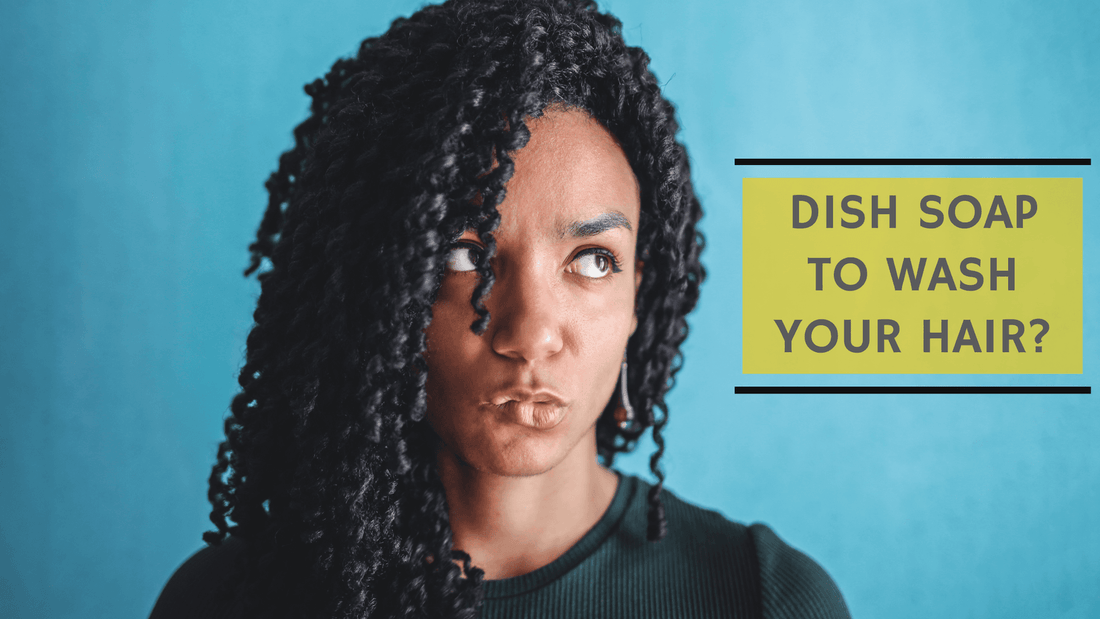Dish soap for hair isn’t anything new, but every now and then it starts making its rounds through social media. Lately, I have been seeing using dish soap to wash your hair trending on TikTok.
Many YouTubers and beauty vloggers are going gaga over its hair benefits. The strong formula of this detergent may help remove excess oil and dandruff. But is washing your hair with this soap really safe? This article explores why we don’t think you should be ditching your shampoo for the cheaper dish soap for your curly hair.
Can You Wash Your Hair With Dishwashing Liquid?
Is it safe to wash your hair with dishwashing liquid? The short answer: It won’t kill you, but it could ruin your hair. This trend might save you money in the short term but beware. Source: dominicanhairalliance.com

Dish soap for hair: “But I just used dishwashing liquid to wash and my hair was fine.”
The effects of using such a strong cleanser on your hair happen at a microscopic level so don’t expect to see most changes right away, unless your hair is very damaged or sensitive. The effects are cumulative though, so you will begin to see the impact on your hair after using it a few times.
Just so you can make your own informed decision on whether to use it or not, here’s exactly what happens when you use a typical dishwashing liquid to wash your hair:
1. Dishwashing liquid dries out your scalp and hair
Because it usually contains sodium lauryl sulfate, dishwashing liquid can exacerbate dry scalp, leaving it flaky and irritated. And if you have an oily scalp, your sebaceous glands may start to overcompensate for the huge loss of sebum – and give you even more oiliness to deal with.

The salt in dish soap (used as a cheap way to thicken the formula) will also seriously dry out your hair. Anyone who’s ever been to the beach knows salt air alone is enough to leave your hair looking like tumbleweed – and a dip in the sea without preparing your hair adequately can leave it dehydrated for weeks after. Then there’s the SD alcohol in some dish detergents: it’s highly astringent so it dissolves your natural oils with ease. If there’s enough in the formula, it could also swell your strands till they fracture.
Source: dominicanhairalliance.com
2. Dish soap removes the outer coating from your hair
Your cuticle’s job is to protect the inner layers of your hair. But did you know that there’s a layer on top of the cuticle that protects the cuticle itself? That’s your epicuticle, and it’s made up mostly of lipids, which provide a chemical surface barrier for your hair.
Since it’s so good at breaking down oils, using sodium lauryl sulfate regularly will eventually completely remove this protective layer. Once it dissolves the epicuticle, it gets to work dissolving the entire cuticle, including the cell membrane complex – the ‘glue’ that holds your hair together.
Source: dominicanhairalliance.com

3. Dishwashing liquid can trigger dermatitis on your scalp
When used to wash hair, sodium lauryl sulfate has been shown to set off another skin condition: atopic dermatitis. It turns out the salt in dish detergent isn’t just drying: mixed with the sodium lauryl sulfate in the formula it becomes a serious irritant. The problem is rinse ability: these formulas rinse pretty easily off of dishes. Rinsing it off a human being is another story.
As soon as the sodium lauryl sulfate-salt combination gets in contact with keratin – the stuff your hair and the outer layers of your skin are made of – it sticks to it. That’s creepy, but also pretty ironic, considering that the social media users who push dishwashing liquid think they’re getting their hair cleaner. In reality, they’re actually creating more buildup.

This is bad for your hair, but it’s the consequences for your skin and body that are most worrying. The fact that you can’t rinse dishwashing liquid off fully means it has more time to stay on your skin and potentially cause irritation.
The safe level for sodium lauryl sulfate in leave-on products is very low; 1%. The level in dishwashing liquid is several times that. If the residue it leaves behind exceeds that 1% concentration or you use this stuff repeatedly and it starts to accumulate on your skin, it could potentially be toxic.
Source: dominicanhairalliance.com
There are rare occurrences when your stylist might use dish soap for hair. That would be removing grease, oils, and extreme product build-up from your hair. Have you used dish soap to clean your hair? Let us know in the comments.



1 comment
I appreciate the information concerning using dish soap for shampooing your hair. I can testify that it is true about our hair bring stripped of it natural oils. I never used dish soap but I have used other shampoo products that were not for African American hair and I found out by just touching my hair strands that I could feel that squeaky clean feel made my hair strands feel dry. I did this after I tried Wonder Curl cleanser and the proof was there. No joke ladies, it is for real.